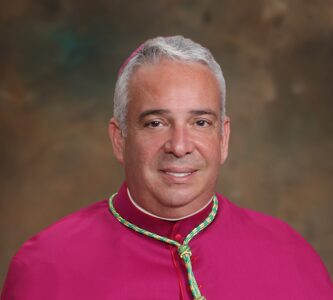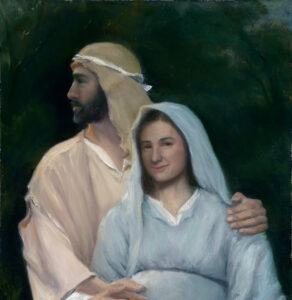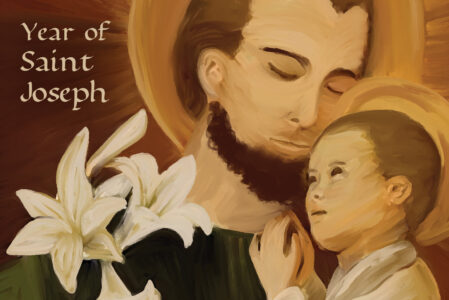Catholic Youth Speaker and Musical Artist
(Youth Tracks)
Video


Catholic Youth Speaker and Musical Artist
(Youth Tracks)
Video

Associate Director, USCCB Secretariat of Evangelization and Catechesis
(English and Spanish tracks)
Video – (Spanish Track)

CEO and Founder, FOCUS Ministries
(English tracks)
Video

Archdiocese of Philadelphia
(English and Spanish tracks)
Video – (Spanish Track)

Year of St. Joseph Prayer Card
Parishes are welcome to download and print copies of the prayer cards in the languages listed below. If you would like a larger quantity, please email ocrequest@archspm.org with the name of your parish and the quantity required. We will contact you to confirm and send them directly to the parish office.
Prayer for the Year of Saint Joseph
English (Download Prayer Card)
Father,
Who gave St. Joseph to Jesus and Mary
As protector and guide,
Grant that our Archdiocesan Synod,
Under his protection and guidance,
May help us discern your direction for our Church.
May we listen as he listened,
Trust as he trusted,
Obey as he obeyed,
Receive as he received,
Love as he loved,
And share in his life of devotion to Jesus and Mary.
Amen.
St. Joseph, pray for us.
Spanish (Download Prayer Card)
Oración para el Año de San José
Padre celestial,
Que diste a San José a Jesús y María
Como su protector y guía,
Concede que, nuestro Sínodo Arquidiocesano,
Bajo su protección y guía,
Nos ayude a discernir la dirección para nuestra Iglesia.
Haz que escuchemos como él escuchó,
Confiemos como él confió,
Obedezcamos como él obedeció,
Recibamos como él recibió,
Amemos como él amó,
Y compartamos, como él,
su vida de devoción a Jesús y María.
Amén.
San José, ruega por nosotros.
Vietnamese (Download Prayer Card)
Năm Cầu Nguyện Thánh Giuse
Lạy Cha Chúng Con Trên Trời,
Cha đã đặt Thánh Giuse làm Đấng Bảo Trợ và
hướng dẫn Đức Chúa Giêsu và Mẹ Maria,
Xin Cha ban cho Hội Nghị của
Tổng Giáo Phận chúng con,
nhờ sự che chở và hướng dẫn của Thánh Nhân,
nhận biết được ý Cha muốn
thực hiện cho Giáo Hội.
Chớ gì chúng con biết mở lòng để
lắng nghe như Thánh Nhân,
tin tưởng như Thánh Nhân,
vâng phục như Thánh Nhân,
đón nhận như Thánh Nhân,
yêu mến như Thánh Nhân,
và chia sẻ đời sống của Ngài là hiến mình
cho Chúa Giêsu và Mẹ Maria.
Amen.
Lạy Thánh Giuse, xin cầu cho chúng con.
Polish (Download Prayer Card)
Rok Świętego Józefa
Ojcze Niebieski, który uczyniłeś św.
Józefa opiekunem i przewodnikiem
Jezusa i Maryi, spraw, aby nasz archidiecezjalny
synod prowadzony pod jego opieką
i przewodnictwem pomógł nam w rozeznaniu
kierunku dla naszego Kościoła.
Abyśmy potrafili słuchać,
tak jak on potrafił słuchać; ufać, tak jak on ufał;
być posłuszni, tak jak on był posłuszny;
abyśmy potrafili przyjmować,
tak jak on umiał przyjąć i kochać,
tak jak on ukochał, i abyśmy naśladowali go,
poświęcając nasze życie Jezusowi i Maryi.
Amen.
Św. Józefie, módl się za nami!
Swahili
Baba wa Mbinguni,
Uliyempa Mtakatifu Yosefu kwa Yesu na Maria
Kama mlinzi na mwelekezi,
Tujalie ili Sinodi yetu ya Jimbo kuu
Chini ya ulinzi na mwongozo wake,
Tuweze kutambua mwelekeo wa Kanisa letu.
Tuweze kusikiliza jinsi alivyosikiliza,
Kuamini jinsi alivyoamini,
Kutii jinsi alivyotii,
Kupokea jinsi alivyopokea,
Kupenda jinsi alivyopenda,
Na kushiriki kwa maisha ya kujitolea kwa Yesu na Maria
Amina
Mtakatifu Yosefu, utuombee

In November 2020, Pope Francis declared the next year would be dedicated to St. Joseph, husband of Mary and foster-father of Jesus Christ. St. Joseph, as you know, is the Patron of the Universal Church. What an amazing opportunity in the midst of our global turmoil to reflect on our steadfast protector, defender, and humble obedient servant. The following forty reflections and prayers can be read in any order and on any day, written by priests’ and deacons’ who use the myParish app in their parishes. Join us to reflect on the life of St. Joseph.

We don’t really have a clear picture of St. Joseph’s life. He is mentioned directly only in the birth and childhood stories in the Gospels of Matthew and Luke. Mark never mentions him and John only refers to him twice and then indirectly when he calls Jesus the “Son of Joseph”. We know that Joseph was alive and involved in the life of Jesus’ early life, at least up until the time that Jesus was found in the Temple in Jerusalem listening to the teachers and asking them questions and astounding them with his understanding and answers as written in Mark’s Gospel. Biblical scholars are certain that St. Joseph died well before the public life of Jesus.
I think that the significance of St. Joseph and why he is so revered is given to us in the Gospel from Matthew. Mary was betrothed to Joseph before she “was found with child through the Holy Spirit”. By the custom of those days, a betrothal was a significantly more sacred bond than an engagement is today. This bond was legally as strong as marriage except they lived apart and had no conjugal relations and the woman’s parents were still responsible for her care and support. Marriage was the final seal upon the bond. So if you wanted to terminate or end a betrothal, the process was very similar to a formal legal divorce. Again, referring to the cultural norms of that time, a woman betrothed but not married who became pregnant, had committed a serious sin and an unforgivable social and moral transgression. Joseph could by law, have Mary stoned or cast out from the community. But what did Joseph do? As we heard in the Gospel, “since he was a righteous man yet unwilling to expose her to shame, decided to divorce her quietly. But then an angel of God appeared to him in a dream and said, Joseph, Son of David, do not be afraid to take Mary your wife into your home. For it is through the Holy Spirit that this child has been conceived in her.” Joseph, being a man of great faith, did as the Angel of God had instructed him. It was Joseph’s faithful response to God that was most significant.
We can reflect on Joseph’s faith and devotion to Mary as we continue our journey through Lent. Recall that we are called to prayer, repentance, and almsgiving. Joseph had a great love for Mary but also God and through that love, he had the courage to do as instructed and to dismiss the possible family and community disgrace that faced both him and Mary.
We can look to Joseph for inspiration and courage to live our faith as Jesus has instructed us to do. That is why it is so important for each of us to form a personal and intimate relationship with the Triune God, Father, Son, and Holy Spirit through prayer and reflection, taking advantage of the Sacraments, especially the Sacrament of Reconciliation or confession. You will hear me shout the need for regular confession until my last breath is drawn. Many Catholics, including myself, did not go to confession out of fear or a lack of a clear understanding of the Sacrament. We humans sin. We all have crosses to carry and some of those crosses cause us to sin and sometimes those sins are what the Church refers to as grave or mortal sins. Whatever the sin we commit or the cross we bear, it inflicts injury to our relationship with God. People who don’t understand the true essence of the Sacrament often take the position that they confess their sins to Jesus directly and He (Jesus) knows they are sorry and are forgiven. Except that Jesus gave the power to forgive on earth to the Apostles and their successors. It is through the act of going to a priest and confessing our sins and being truly sorry that we are absolved of our sins and we receive Sanctifying Grace that heals the wounds of sin and strengthens us against the evil one who is always looking to steal our soul. If you have not been to confession for some time, for whatever reason, pray for the strength to go and fully reunite yourself with the Triune God. In my case, and I think in everyone’s case, the Sacrament of Reconciliation along with frequent Holy Communion is the healing and bonding agents that solidify our personal and intimate relationship with God. To have that relationship allows us the ability to be guided by the Holy Spirit.
Like Joseph who trusted God and the message he was given through the Angel of God, we too must have the faith and courage to love God and others and to respond to God’s will so that we can achieve the ultimate goal in our lives, eternal salvation.
God Bless and continue to build that personal and intimate relationship with God.
AND GET TO CONFESSION SOON!
~Deacon Jim Nelson
St. Joseph, Battle Creek, Mi

When we celebrate the Feast of the Holy Family of Jesus, Mary, and Joseph, we are reminded that they are a model of holiness and faithfulness for all families. Although they were the perfect family they experienced many trials and difficulties in their day. For example, when Mary and Joseph were in Bethlehem to be enrolled by the decree of Caesar Augustus, Mary’s body was beginning the process of giving birth. Since there was no room for them at the inn, where was she going to deliver her baby? I could only imagine what was going through St. Joseph’s mind. Because of their faith in God, the Holy Spirit guided them to a cave and there Mary gave birth to the Savior of the world.
“May the Holy Family, who had to overcome many painful trials, watch over all the families in the world, especially those who are experiencing difficult situations. May the virtues of the Holy Family also help men and women of culture, and political leaders so that they may defend the institution of the family, based on marriage, and so that they may sustain the family as it confronts the grave challenges of the modern age!”
Pope John Paul II– Feast of the Holy Family 2004
“A family that prays together, stays together.” Let us exemplify the Holy Family of Jesus, Mary, and Joseph as we are called to strengthen our families through self-less acts of humility and charity.
Year of St. Joseph
On Dec. 8, Pope Francis issued an apostolic letter, Patris corde “With a Father’s Heart” for the 150th anniversary of the declaration of St. Joseph as Patron of the Universal Church. To mark the occasion, the Pope proclaimed a “Year of St. Joseph” from Dec. 8, 2020, through Dec. 8, 2021, explaining that the aim of this special year is “to increase our love for this great saint, to encourage us to implore his intercession and to imitate his virtues and his zeal.” Also, a plenary indulgence is available to Catholics throughout the year under specific conditions. Please visit the Diocese website grdiocese.org for more information.
Fr. Tony Russo
Pastor
Our Lady of Consolation
Rockford, MI

One of my summer jobs during college seminary was mowing the parish cemeteries. Each day I loaded the zero-turn mower and the string trimmer onto the trailer and drove to each cemetery. The mowing was straightforward as long as I avoided hitting any headstones. The trimming was another story.
After just a couple of weeks, I had some rather large calluses on my hands. It’s not that I did not like manual labor, but the life of a seminarian during the school year involved a lot more academic work than physical work. My hands were not used to the hard work and needed to develop calluses – to toughen up so I could work even harder.
One of the lessons I learned those summers in the cemetery was the value of hard work. The more we exercise the virtue of industriousness, the more we build up “calluses.” The virtue of industriousness is the good habit of working diligently. It’s not a stretch to imagine St. Joseph, a carpenter, and laborer, knowing a thing or two about callused hands and industriousness. Hard work and diligence in the work of his hands would have been virtues Joseph possessed and passed on to his son. Joseph not only taught Jesus how to be a carpenter, but also the necessity of hard work—others relied on Joseph for the materials of everyday life.
It is simply not enough to know how to do something, but you also must work hard until the task is completed. St. Joseph is a great example to all of us of a man who knew how to work and who worked diligently to provide for his family while making beautiful things for others. When we work hard, we participate in God’s act of creation. We take ordinary materials and fashion them into something useful, good, and beautiful. May the callused hands of St. Joseph the Worker remind us that industriousness is a virtue that we need to practice in our own lives.
Fr. Tyler Bischoff
Parochial Administrator
St. Catherine, Ossineke – St. Anne, Harrisville – St. Gabriel, Black River – St. Raphael, Mikado, MI

We know very few details about the life of Saint Joseph. He is mentioned four times in the New Testament, and two of those times (Luke 3:23 and John 1:45) are only in passing. Joseph plays a significant role only in the first two chapters of Matthew and of Luke, and those chapters are far more theological than historical. In Luke Joseph plays a background role (best supporting actor?) to Mary and Jesus. Matthew portrays a more active Joseph, and on that Joseph, I offer these reflections.
Matthew patterns Saint Joseph after the stories of Joseph in the Book of Genesis. In Genesis God spoke to Joseph in dreams; likewise in Matthew. In Genesis Joseph eventually brings his family into Egypt and saves them from death; likewise in Matthew. The evangelist whom we call Matthew is not a historian or a biographer. He is not writing a life of Jesus, let alone one of Joseph. He is simply an early Jewish Christian trying to share his understanding of the mystery of Jesus. What does Matthew’s Joseph tell us about Jesus and about our response to him?
Prayerfully read the first two chapters of Matthew, taking time with each part: the genealogy, the first dream, the visit of the sages, the second dream, the killing of the babies, the third dream, the return to Israel. The evangelist presents a Joseph who encapsulates the whole people of Israel, from Sarah and Abraham down to the time of Jesus. Matthew’s Joseph is an upright person, faithful to the God of his ancestors. Matthew has God speak to Joseph in dreams; and Joseph, though he might not fully understand, obeys God. He accepts Mary as his wife and her child as his son. He takes Mary and Jesus to Egypt, thereby saving the child from Herod’s wrath. After Herod’s death, he returns with his family to the land of Israel (although not to his hometown of Bethlehem but to a new home in Nazareth). Then he disappears from the scene, and we never see him again.
What does Matthew’s portrayal of Joseph tell us? I see someone whose life is open to God. How open to God are we? Do we hear God speak to us in Sacred Scripture? in our tradition? in our life experiences? in our dreams? How open and alert are we to God’s presence? Do we listen for God’s call? How do we respond? Even if the evangelist doesn’t say so, the Joseph whom Matthew presents has to be a person of prayer, a person whose heart remains open to God, a person open to obeying God even when God’s call does not make sense. Matthew’s Joseph lived in the presence of God … and without denying the divinity of Christ, in this case, I am not referring to Jesus.
What does prayer mean? I think that it means living, like Joseph, in the presence of God. Prayer can be formal or informal, public or private, verbal or silent. We can pray in our own words or in those of others. We can set aside time for deliberate, conscious contact with God, and we can experience God’s presence in the unplanned events of daily life. Most of us need all those kinds of prayer. If I don’t set aside time for deliberate contact with God, I am not likely to find God in the rest of my life. If I don’t find God in unexpected experiences, my formal prayer is likely to be hollow. For example, if I don’t find God in a homeless person, I am not likely to find God at Mass. Likewise, unless I allow God to change me at Mass, I am not likely to see God in a homeless person.
Prayer is listening. We come to God in prayer with the whole gamut of human experience—family relationships, health concerns, financial security, sexual desires, etc. We need to bring all those things to God in prayer. Otherwise, they are going to create background noise and keep us from hearing what God wants to say. Once we’ve brought our issues and concerns to God, however, we need to put them aside, quiet ourselves, and let God speak. We have to allow our little egos to recede into the background and open our lives to the ultimate reality that is God. God’s voice may not always be clear and distinct, and our response may be awkward and confused. We may have to change course more than once. The Joseph whom Matthew depicts would have experienced the same—after all, dreams are sometimes more confusing than clear! A faithful Jew, he would have lived in God’s presence. That is why we call him Saint Joseph.
Loren Connell, OFM, is a Franciscan friar and Catholic priest ministering in retirement at St Francis Retreat House in Easton, Pennsylvania.